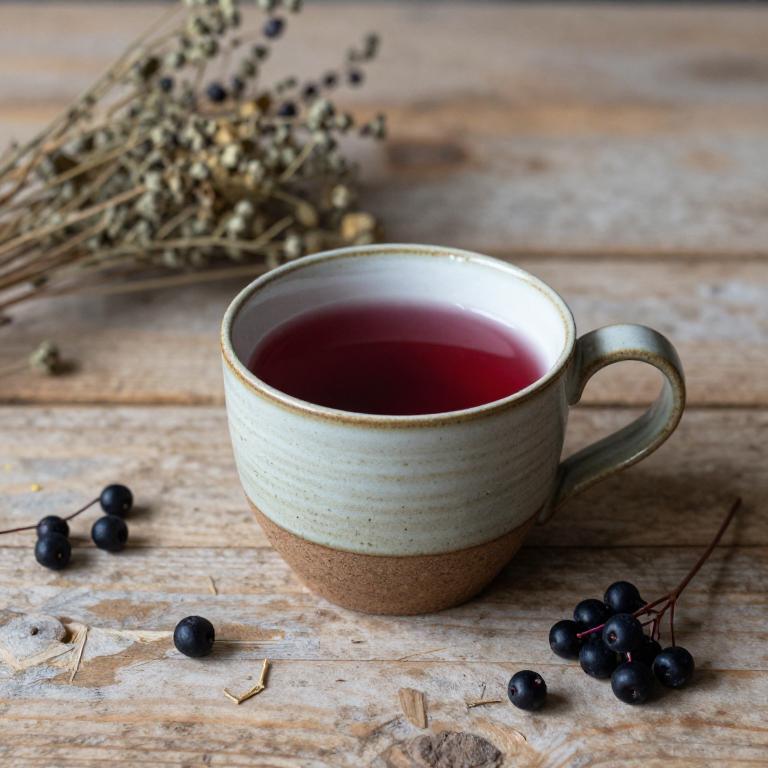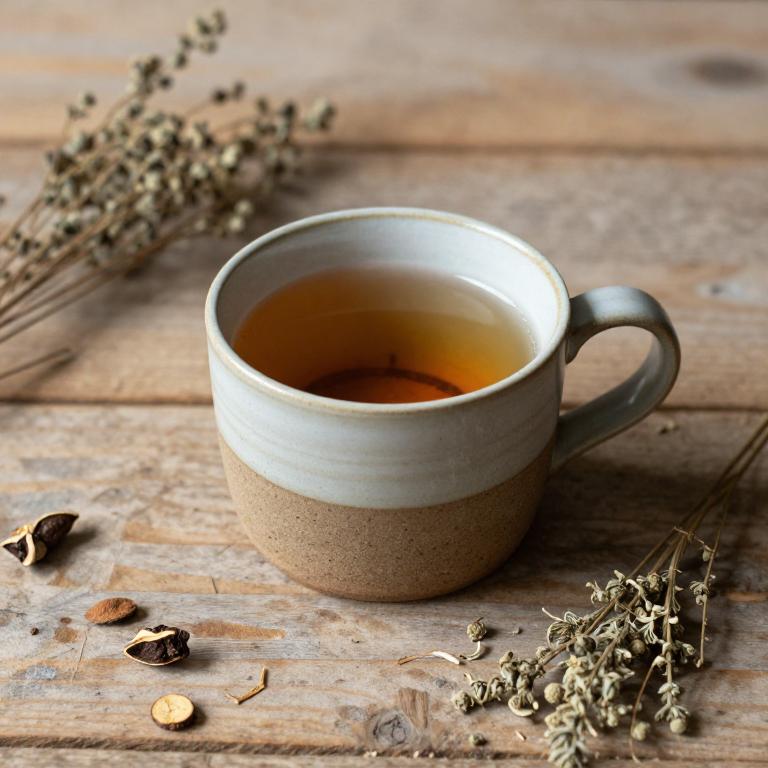10 Best Herbal Teas For Flu

Herbal teas can be a natural and soothing remedy for flu symptoms, offering a gentle alternative to conventional medications.
Common ingredients like echinacea, ginger, and peppermint are often used for their immune-boosting and anti-inflammatory properties. These teas can help alleviate symptoms such as congestion, sore throat, and fever by promoting sweating and easing respiratory discomfort. They are generally safe for most adults and can be enjoyed hot or warm to provide comfort during illness.
However, it's important to consult a healthcare provider before using herbal teas, especially for children or individuals with chronic conditions.
Table of Contents
- 1. Camellia (Camellia sinensis)
- 2. Echinacea (Echinacea purpurea)
- 3. Thyme (Thymus vulgaris)
- 4. Ginger (Zingiber officinale)
- 5. Peppermint (Mentha piperita)
- 6. Fennel (Foeniculum vulgare)
- 7. Rosemary (Rosmarinus officinalis)
- 8. Black elderberry (Sambucus nigra)
- 9. Stinging nettle (Urtica dioica)
- 10. Ceylon cinnamon (Cinnamomum verum)
1. Camellia (Camellia sinensis)

Camellia sinensis, the plant from which green, black, and white teas are derived, is often used in herbal teas to support immune health and alleviate flu symptoms.
These teas contain antioxidants and anti-inflammatory compounds that may help reduce the severity of flu symptoms and promote faster recovery. While not a cure for the flu, camellia sinensis herbal teas can serve as a complementary remedy to boost the body's natural defenses. The warmth and soothing properties of these teas also help to ease congestion and provide comfort during illness.
However, it is important to consult a healthcare professional before using herbal teas, especially for individuals with pre-existing conditions or those taking medications.
2. Echinacea (Echinacea purpurea)

Echinacea purpurea, commonly known as purple coneflower, is a popular herbal remedy often used to support immune health and alleviate symptoms of the flu.
This flowering plant, native to North America, contains compounds such as alkamides, caffeic acid derivatives, and flavonoids, which are believed to have antimicrobial and anti-inflammatory properties. Herbal teas made from echinacea are typically consumed during the early stages of a cold or flu to help reduce the severity and duration of symptoms. While some studies suggest it may help shorten the duration of colds, more research is needed to confirm its effectiveness against the flu specifically.
As with any herbal supplement, it is advisable to consult a healthcare provider before use, especially for individuals with allergies or those taking other medications.
3. Thyme (Thymus vulgaris)

Thymus vulgaris, commonly known as thyme, is a popular herb used in herbal teas to support immune health and alleviate symptoms of the flu.
This aromatic herb contains compounds like thymol and carvacrol, which have antimicrobial and antiviral properties that may help combat respiratory infections. Thyme tea is often consumed warm to soothe a sore throat and reduce congestion, making it a comforting remedy during flu season. Its ability to promote sweating and ease respiratory discomfort makes it a favored choice in traditional herbal medicine.
When brewed properly, thyme herbal tea can serve as a natural and soothing option to support the body's recovery from flu-like symptoms.
4. Ginger (Zingiber officinale)

Zingiber officinale, commonly known as ginger, is a popular herbal ingredient used in teas to help alleviate flu symptoms.
Ginger tea is valued for its warming properties and ability to soothe sore throats and ease nausea, which are common during illness. It contains compounds like gingerol and shogaol that have anti-inflammatory and antioxidant effects, which may support the immune system. Drinking ginger tea can also help reduce fever and promote sweating, aiding in the body’s natural healing process.
As a natural remedy, ginger tea is often recommended as a complementary treatment to support recovery from the flu.
5. Peppermint (Mentha piperita)

Mentha piperita, commonly known as peppermint, is a popular herb used in herbal teas to help alleviate symptoms of the flu.
Its refreshing scent and cooling properties can help soothe a sore throat and reduce congestion, making it a comforting choice during illness. Peppermint tea is rich in antioxidants and contains compounds like menthol, which may help ease respiratory discomfort and promote clearer breathing. Drinking peppermint tea can also help relieve headaches and nausea, which are common symptoms associated with the flu.
While it is not a cure for the flu, it can support the body's natural healing process and provide relief from various flu-related discomforts.
6. Fennel (Foeniculum vulgare)

Foeniculum vulgare, commonly known as fennel, is a popular herb used in herbal teas to support relief from flu symptoms.
The seeds of fennel contain essential oils, including anethol, which have mild antispasmodic and anti-inflammatory properties. Drinking fennel tea can help soothe coughing, ease congestion, and reduce fever associated with the flu. It is often combined with other herbs like ginger or peppermint to enhance its therapeutic effects.
However, while fennel tea may offer some comfort, it should not replace medical treatment for severe flu cases.
7. Rosemary (Rosmarinus officinalis)

Rosmarinus officinalis, commonly known as rosemary, is a fragrant herb often used in herbal teas to support immune health during flu season.
This aromatic plant contains essential oils like camphor and pinene, which may help reduce inflammation and ease respiratory symptoms. Rosemary tea is believed to promote circulation and may help alleviate congestion and soothe sore throats. While it is not a cure for the flu, it can serve as a complementary remedy to support the body’s natural healing processes.
As with any herbal remedy, it is advisable to consult a healthcare professional, especially for those with existing health conditions or who are taking medications.
8. Black elderberry (Sambucus nigra)

Sambucus nigra, also known as European elderberry, is a popular herbal ingredient used in teas to support immune health during flu season.
The berries are rich in antioxidants, vitamins, and flavonoids, which may help reduce the severity and duration of flu symptoms. When brewed into a tea, sambucus nigra can soothe sore throats and alleviate congestion, making it a comforting remedy for those suffering from the flu. However, it is important to use the berries properly, as raw or unripe elderberries can be toxic.
While sambucus nigra tea is generally considered safe when prepared correctly, it should not replace professional medical advice, especially for severe flu cases.
9. Stinging nettle (Urtica dioica)

Urtica dioica, commonly known as stinging nettle, has been traditionally used in herbal teas to support immune health and alleviate symptoms of the flu.
This plant is rich in vitamins, minerals, and antioxidants that may help reduce inflammation and boost the body's natural defenses against viral infections. When brewed into a tea, stinging nettle can provide a soothing effect and may help relieve congestion and sore throat associated with flu symptoms. However, it is important to note that while it may offer supportive benefits, it should not replace conventional medical treatments for the flu.
As with any herbal remedy, it is advisable to consult with a healthcare professional before use, especially for individuals with allergies or existing health conditions.
10. Ceylon cinnamon (Cinnamomum verum)

Cinnamomum verum, commonly known as true cinnamon, is often used in herbal teas to support immune health and alleviate symptoms of the flu.
The essential oils in cinnamon, particularly cinnamaldehyde, possess antimicrobial and anti-inflammatory properties that may help reduce viral activity and soothe sore throats. When brewed into a warm tea, cinnamon can provide a comforting and aromatic remedy that encourages hydration and ease congestion. It is typically combined with other flu-supporting herbs like ginger, lemon, and honey to enhance its therapeutic benefits.
While cinnamon tea is not a cure for the flu, it can serve as a natural complement to conventional treatments, promoting overall wellness during illness.